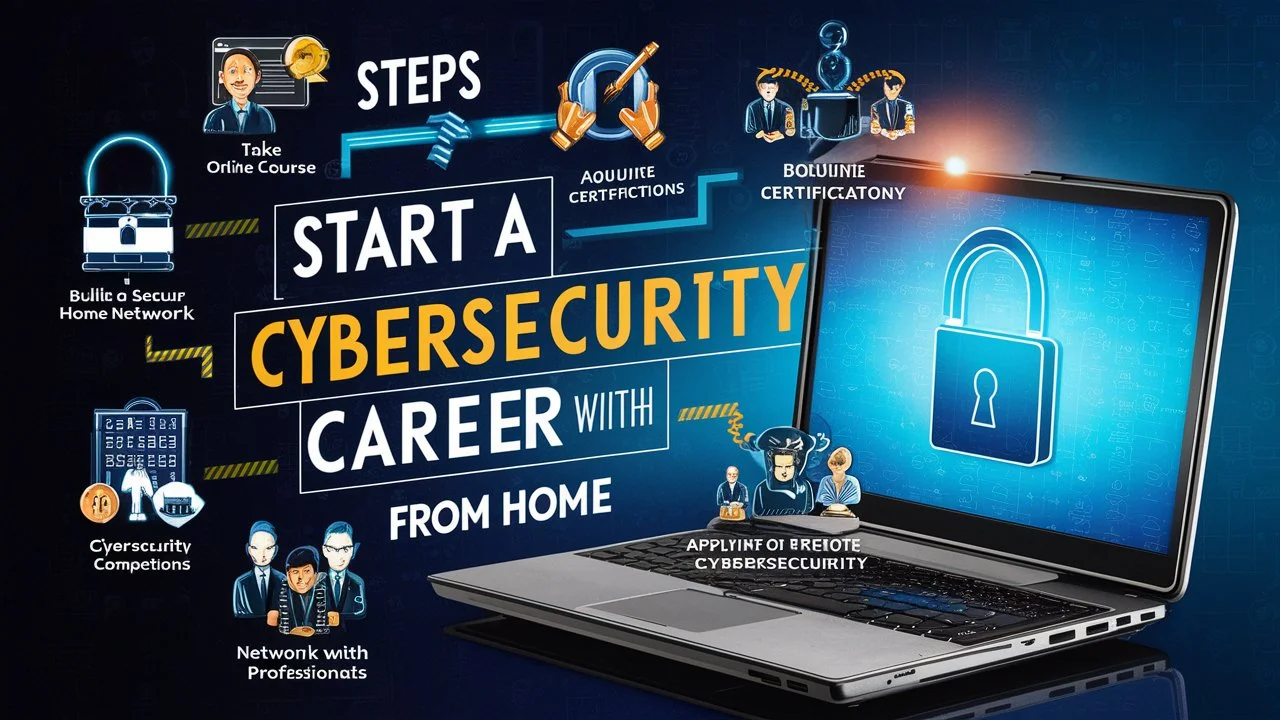Introduction
The move to remote work brought many changes. One is that working from home in cybersecurity is more valuable. This post will cover how to work from home in cybersecurity. It will also cover what you should do to stay safe online. It will also cover several career paths you can choose.
Can I do cybersecurity work from home?
Yes, you can do cybersecurity work at home. From there, you can concentrate more on your work compared to office distractions.
It also manages cybersecurity work, which often includes system monitoring, threat analysis, and strategy development. They don’t need a physical office. This flexibility is very helpful.
Flexibility: Remote work rearranges schedules to merge personal and professional lives.
Productivity: Many people discover that working away from workplace distractions increases their productivity.
9 Ways to do Cybersecurity work at Home
1. Identify the connected devices.
It is essential to know which devices are linked to your network. This covers, among other things, laptops, tablets, cell phones, and smart home appliances.
Network scanners are one type of tool. They may help you check every device on your network.
2. Protect Your Wireless Network
Setting Strong Passwords: Craft intricate passwords incorporating characters, digits, and symbols.
Turn on network encryption: For more security, be sure your Wi-Fi uses WPA3.
3. Update your device’s software and firmware.
Cybercriminals may be able to take advantage of weaknesses in outdated software. Regular updates patch these vulnerabilities.
If at all possible, turn on automatic updates to guarantee that your systems are always up-to-date.
4. Watch Out for Unsafe Websites
Not every website is secure. Always check if the URL begins with “https” and if the address bar has a padlock icon.
Use tools like browser extensions. They alert you to unsafe websites.
5. Create a schedule to copy your files at fixed intervals.
Regular backups are crucial. They safeguard your data from ransomware and other security risks. You can use:
Cloud backups: Dropbox and Google Drive are examples of such services.
Local backups: USB sticks or external hard drives.
6. Refrain from careless downloading.
Installing files from unreliable sites may infect your computer with malware. Download software only from reputable or official websites.
7. Use device encryption to avoid unauthorized access.
Encryption protects your data by making it unreadable without the correct key. Both macOS and Windows come with integration.
8. Use secure passwords.
Make sure your passwords are strong before anything else. For each account, choose a new password, and think about using a password manager to keep track of them.
9. Be wary of phishing scams:
In a phishing scam, a malicious person tries to get information like credit card numbers, passwords, account information, or other personal information from you by convincing you to give it to them under pretenses. Phishing schemes usually come via spam, email, or pop-up windows.
Can I study cybersecurity at home?
To learn cybersecurity, there are lots of internet resources. Some are paid and free they also give you a certificate. They cover introductory to intermediate levels.
Online platforms: like Coursera, Udemy, and edX. You can get industry-recognized.
Certifications online: include CompTIA Security+, CISSP, and CEH.
Advantages of Self-Paced Learning
Flexibility: You can arrange your studies around other obligations. And, you can learn at your speed.
Cost-effective: A lot of Internet materials and courses are inexpensive or free.
Career Paths in Cybersecurity from Home:
Cybersecurity Analyst
Cybersecurity experts watch for security lapses in networks and systems. They then react to them. You must have a firm grasp of incident response and network security before you can begin.
Penetration Tester
Ethical hackers, often known as penetration testers, mimic attacks to find weaknesses. This profession requires expertise in several hacking tools and tactics.
Security Engineer
Security engineers create and carry out secure network solutions. You need a deep understanding of system architecture.
You also need to know about security measures. This position requires this knowledge.
IT Project Manager
IT project managers supervise cybersecurity initiatives, guaranteeing their timely and cost-effective completion.
Strong leadership and organizational abilities are necessary for this position.
How can I do cybersecurity work at home with no experience?
Many companies provide internships and entry-level positions that give employees practical experience. Seek out roles such as IT Support Specialist or Junior Security Analyst.
You can get experience through certifications and volunteering. CompTIA Security+ certifications are great places to start. Furthermore, volunteering for small firms or nonprofits can yield invaluable experience.
Conclusion
Working in cybersecurity from home is feasible and beneficial. Follow key practices like securing your Wi-Fi, updating software, and avoiding phishing scams. Career paths include cybersecurity analyst and penetration tester. Start with certifications and internships. Online resources make learning accessible and flexible, enabling a secure and productive home workspace.
FAQs:-
1. What types of cybersecurity jobs can be done from home?
- Roles such as cybersecurity analyst, penetration tester, security engineer, and IT project manager are commonly performed from home.
2. How can I stay safe online while working from home?
- Secure your Wi-Fi with strong passwords and encryption, regularly update your software and firmware, use secure passwords, avoid phishing scams, and be cautious of unsafe websites.
3. What tools can help me secure my home network?
- Network scanners to identify connected devices, strong passwords, WPA3 encryption, browser extensions for detecting unsafe websites, and automatic software updates.
4. What are the advantages of learning cybersecurity online?
- Online learning offers flexibility to study at your own pace, cost-effectiveness with many free or inexpensive resources, and the ability to balance studies with other obligations.
5. How do I start a career in cybersecurity with no experience?
- Look for entry-level positions or internships, obtain relevant certifications like CompTIA Security+, and consider volunteering for small firms or nonprofits to gain practical experience.

